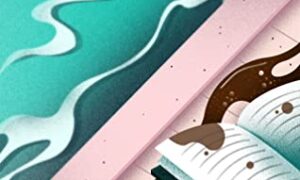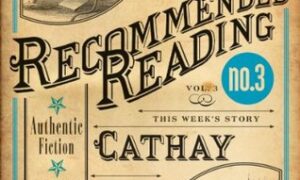 The Novel Cure: From Abandonment to Zestlessness: 751 Books to Cure What Ails You by Ella Berthoud, Susan Elderkin
The Novel Cure: From Abandonment to Zestlessness: 751 Books to Cure What Ails You by Ella Berthoud, Susan Elderkin
My rating: 3/5 cats



bibliotherapy is the self-help application of readers’ advisory. i did the whole library science schooling thing, with a specialization in readers’ advisory, for which it seems i have an aptitude (summa cum laude, bitches!), but we never once talked about bibliotherapy, so this was an interesting book for me to read. practitioners of readers’ advisory train in how to help someone select a book for their leisure reading based on their interests and tastes, while bibliotherapy seeks to match a reader with a novel that will help them heal and deal with situations they are facing in their lives.
bibliotherapists will analyze your reading tastes, habits, and yearnings, as well as where you’re at in your personal and professional life, then create a reading list tailored especially for you, which sounds just like basic readers’ advisory work, but this book focuses on the ability of novels to play an active role in the healing process and the emotional lives of readers. is it effective?? i can’t say for sure, and while a casual google-search didn’t bring up anything about any licensed bibliotherapists, apparently it is a viable profession, so it’s gotta be helping someone somewhere.
it’s hard to take it 100% seriously. on the one hand, sure – books can certainly affect readers in profound ways, and literature, speaking as it does to the human condition, can offer object lessons, but a reader has to be willing to take these lessons to heart and either accept or dismiss what they have read. and they can only do so much.
the authors of this book are realistic,
In serious cases of depression, bibliotherapy is very unlikely to be enough. But we urge sufferers to make full and imaginative use of fiction as an accompaniment to medical treatment… novels can often reach sufferers in a way that little else can, offering solace and companionship in a time of desperate need.
bibliotherapy doesn’t profess to cure these various ailments; for example, cancer or baldness or alcoholism are in no way going to be cured by a book, but the idea is that novels can help a reader deal with their own afflictions by seeing the ways in which characters handle similar situations and apply their reading to their own lives, either through emulation or as cautionary tales of “don’t do this, for the love…” it is an idea worth exploring.
some of the included topics are just completely silly ailments, in terms of what a book is going to be able to realistically offer a reader: broken leg, broken china, eating disorders, burning the dinner, chasing after a woman who is a nun, claustrophobia, not being able to find a decent cup of coffee, falling out of a window, etc.
however, for ailments that are less… clinical or are broader in number of people afflicted, such as sadness, adolescent malaise, the horror of aging, or a break-up, i can see this helping someone who is able to respond emotionally to books.
oh, and their cure for unhappiness??
The Novel Cure: From Abandonment to Zestlessness: 751 Books to Cure What Ails You
cheeky, cheeky…
as a book to dip into and treat as an encyclopedia or a reading guide-overview of a ton of different novels, this is a really good resource, even if you don’t buy that books can actually heal you in any appreciable way.
i disagree with some of the selections – The Old Man and the Sea might actually cause rather than cure anger, for example, and Bel Canto is used twice, in a more or less contradictory way. overall, it is a clever little book, but be warned – sometimes i think they give away a little too much plot. not all the time – there are several instances where they rein it in just in the nick of time, but if you want to know every single thing that happens in Wuthering Heights, this book will basically give you the extended cliffs notes.
there was one really good lesson for me in the book:
Procrastination, or the art of avoidance, has nothing whatsoever to do with laziness, or even busyness. Its causes are emotional. Quite simply (and, one could argue, quite sensibly), the procrastinator avoids those tasks which, consciously or subconsciously, he or she associates with uncomfortable emotions, such as boredom (see: boredom), anxiety (see: anxiety), or fear of failure. The problem with allowing an uncomfortable emotion to stand in your way is that, once avoided, tasks that were probably quite achievable to begin with grow larger both in our imaginations – and, often, in actuality – until they loom over us in such an oppressive way that they become worth procrastinating about. And while we’re busy procrastinating and avoiding those uncomfortable emotions, untold opportunities for happiness and success – whole lives, in fact – pass by. It is this sense of a life half lived, and the intense regret that follows, that we should be trying to avoid – not just a few unpleasant emotions that will in any case quickly pass. What procrastinators need, therefore, is a lesson on the catastrophic consequences of running away whenever an unpleasant emotion threatens to ruffle our ponds.
their cure: The Remains of the Day. which i have read, and still i procrastinate!
however, there is a lot here to upset the true book lover. i disagree with all of this, for example:
Some people won’t dog-ear the pages. Others won’t place the book facedown, pages splayed. Some won’t dare make a mark in the margin. Get over it. Books exist to impart their worlds to you, not to be beautiful objects to save for some other day. We implore you to fold, crack, and scribble on your books whenever the desire takes you. Underline the good bits, exclaim “YES!” and “NO!” in the margins. Invite others to inscribe and date the frontispiece. Draw pictures, jot down phone numbers and Web addresses, make journal entries, draft letters to friends or world leaders. Scribble down ideas for a novel of your own, sketch bridges you want to build, dresses you want to design. Stick postcards and pressed flowers between the pages.
When next you open the book, you’ll be able to find the bits that made you think, laugh, and cry the first time around. And you’ll remember that you picked up that coffee stain in the cafe where you also picked up that handsome waiter. Favorite books should be naked, faded, torn, their pages spilling out. Love them like a friend, or at least a favorite toy. Let them wrinkle and age along with you.
no, no, no! i do not doodle web addresses on my friends, nor do i break their spines. i am a good friend, and a better book-owner. pppbbllttt, bibliotherapists! my friends should most certainly not be naked with their pages spilling out. guh-ross!
and aarrgghh – their cure for being put off by giant books is to CUT THEM UP INTO SMALLER PIECES!!!
If it’s a hardcover, stand the book upright and peer down: you’ll see that the pages are divided into a number of “signatures” which are then stitched together. Make your divisions between one signature and the next. The pages of paperbacks are glued to the spine and can be attacked in a more random fashion; you’ll need to carry a supply of paper clips with you to keep the loose leaves together. Suddenly the big fat tome has metamorphosized into a dozen slim tracts, each about the size of a long short story and no longer intimidating at all.
they actually used the word “attacked!!!
BUT IT GETS WORSE!
And don’t be too precious about the loose pages, by the way. Once you’ve read them, throw them away. We’re fond of the notion of blithely letting the pages fly one by one out the window of a fast-moving train (although to recommend such littering would be irresponsible).
the horror!! SO MUCH HORROR, THERE!!
there is a list in here called “the ten best novels for seeming well-read”
i have read three of them. apparently, i am not at all well-read.
i’d better get cracking!
here is how i will do so.
this book introduced me to:
books i had never heard of and now must read:
Cleave
Agapanthus Tango
The House of Paper
Howards End Is on the Landing: A Year of Reading from Home
books i had heard of but never knew i wanted to read, and now do:
Roxana
Pobby and Dingan
Surfacing
The Holy Terrors
The Murder of Roger Ackroyd
So Long, See You Tomorrow
I am Legend and Other Stories
Anywhere But Here
Le Grand Meaulnes
books i had already wanted to read, but now want to read immediately:
Caribou Island
Mildred Pierce
Little Children
First Love
The Sisters Brothers
Under the Skin
The Story of Lucy Gault
After You’d Gone
Incendiary
New Finnish Grammar
The Idiot
and books i now want to REread:
We Have Always Lived in the Castle
Desperate Characters







